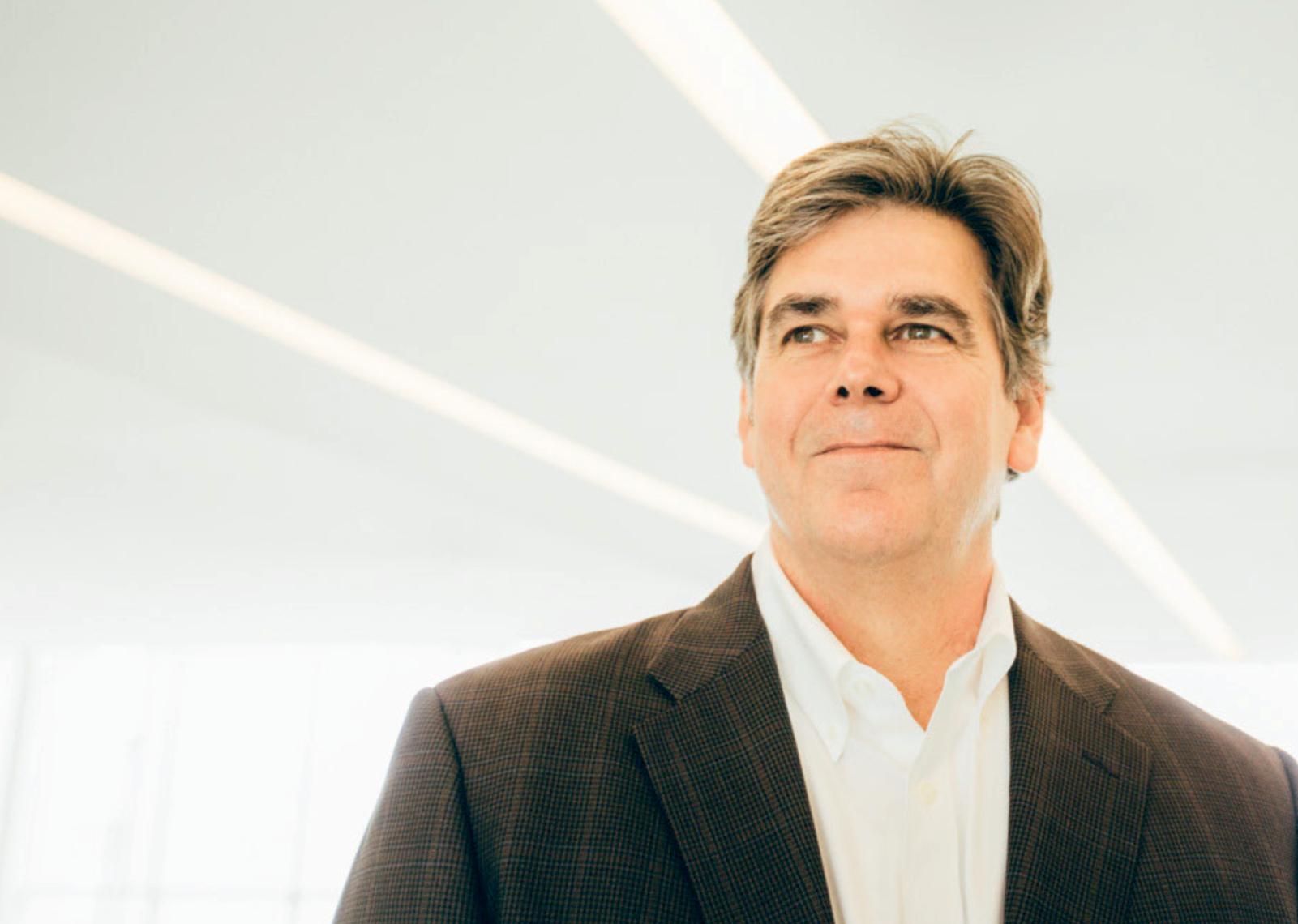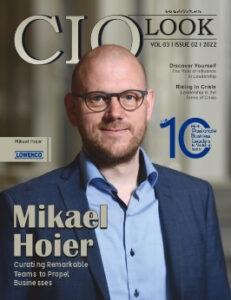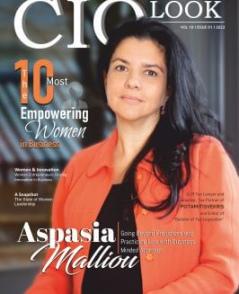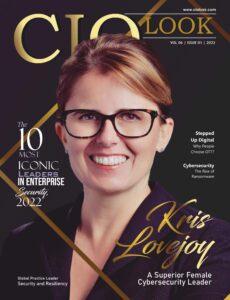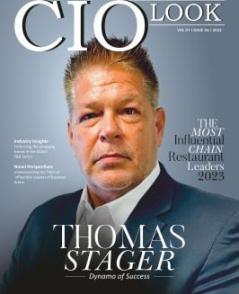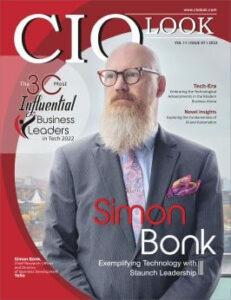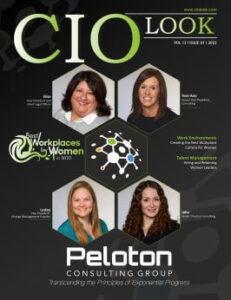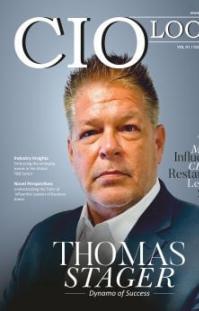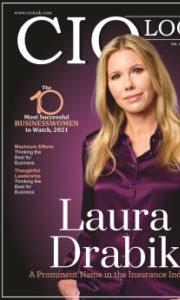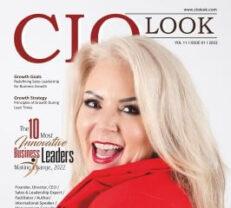The 10 Most Influential Leaders in the Aerospace & Aviation Industry, 2025

Orchestra�ng Evolu�on
The Future of Commercial Avia�on
From Hypersonics to Space Manufacturing
What Does the Future Hold for Aerospace Development?


The 10 Most Influential Leaders in the Aerospace & Aviation Industry, 2025

Orchestra�ng Evolu�on
The Future of Commercial Avia�on
From Hypersonics to Space Manufacturing
What Does the Future Hold for Aerospace Development?

Spearheading Humanity’s Journey to the Stars and Beyond

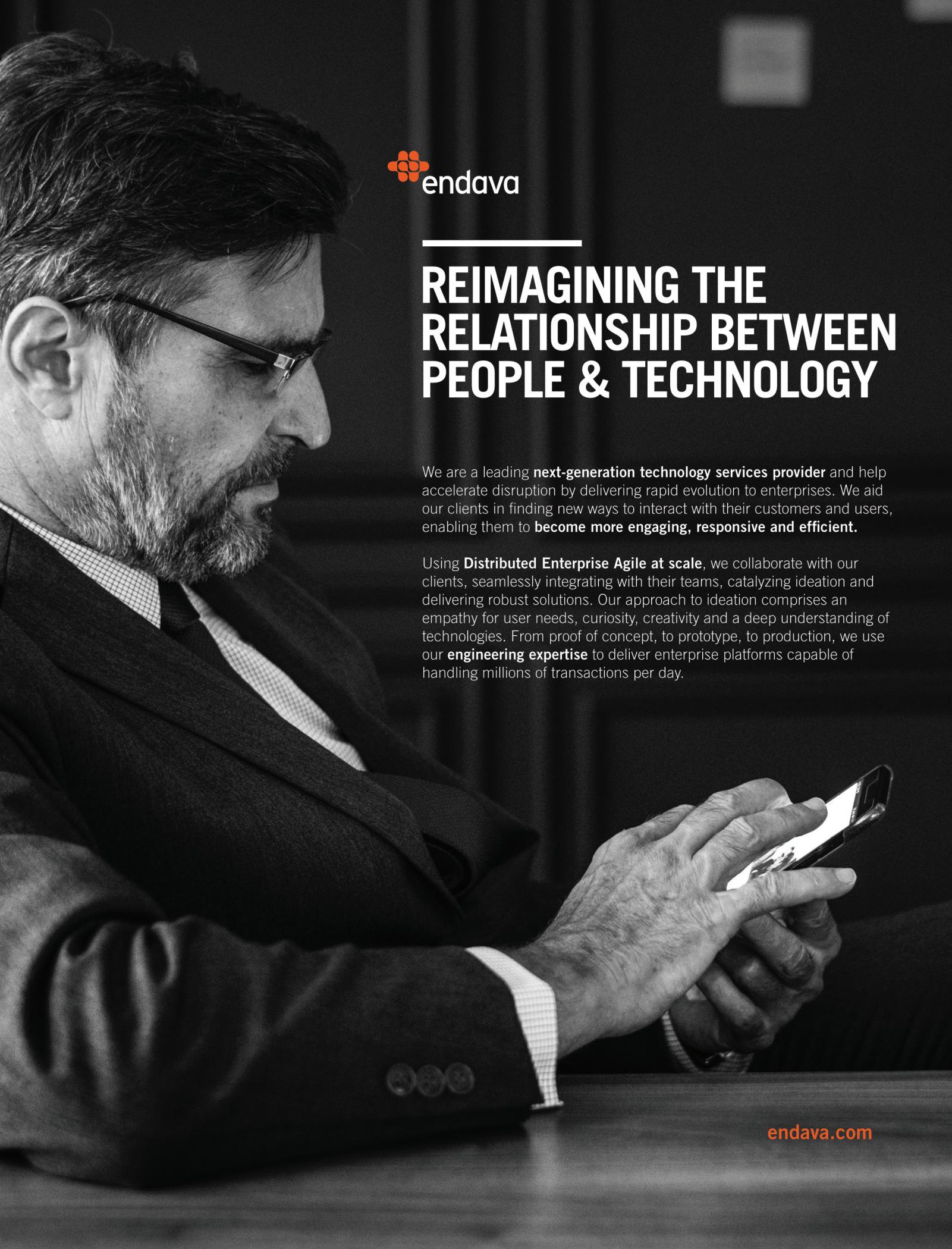




Theaerospaceandaviationindustryhasalways
beenasymbolofhumanambition,innovation,and resilience.In2025,thisspiritonlygrewstronger Frompioneeringsustainableflighttechnologiesto redefiningglobalairmobilityandspaceexploration,the industrystandsonthecuspoftransformationledbya cadreofextraordinaryleaders.
InthisCIOLookspecialedition, The 10 Most Influential Leaders in the Aerospace & Aviation Industry, 2025,we celebratetheindividualswhoarenotjustnavigating change—theyaresteeringit.Theseleaderscomefrom variedbackgrounds—fromcommercialaviationgiants andaerospaceengineeringpowerhousestonewspace-tech startups—buttheyallshareacommonvision:toelevate thefutureofairandspace.
Theirjourneysreflectmorethanprofessionalexcellence; theyreflectthecouragetoinnovate,theforesighttoadapt,
andthecommitmenttodrivesustainableprogress. Whetherit’sadvancingautonomousflightsystems, revolutionizingairtrafficmanagement,orcreatinggreener propulsionsolutions,theirimpactresonatesacrossborders andgenerations.
Thiseditionaimstospotlightnotonlytheirachievements butalsothevaluesandstrategicmindsetsthatdefinetheir leadership.Throughin-depthfeatures,exclusive interviews,andexpertcommentary,weinviteyouto explorehowthesepioneersarepushingboundariesand inspiringthenextwaveofaerospaceevolution.
Asyouturnthesepages,youmaybeinspiredbytheir storiesandremindedthattheskyisnolongerthelimitit's justthebeginning.
Happy Reading!
Spearheading Humanity’s Journey to the Stars and Beyond
20 Denon Prawiraatmadja
Architect of Air Mobility and Champion of Purpose-Driven Leadership
16
24
Orchestrating Evolution The Future of Commercial Aviation
From Hypersonics to Space Manufacturing
What Does the Future Hold for Aerospace Development?


PoojaMBansal Editor-in-Chief
CONTENT
Deputy Editor Anish Miller
Managing Editor Prince Bolton
DESIGN
Visualizer Dave Bates
Art & Design Director Davis Mar�n
Associate Designer Jameson Carl
SALES
Senior Sales Manager Wilson T., Hunter D.
Customer Success Manager Ward M.
Sales Execu�ves Tim, Smith
TECHNICAL
Technical Head Peter Hayden
Technical Consultant Victor Collins June,
Research Analyst Eric Smith
SEO Execu�ve Alen Spencer
FOLLOWUSON


www facebook.com/ciolook
www twi�er.com/ciolook
WE ARE ALSO AVAILABLE ON

CONTACTUSON
Email info@ciolook com
For Subscrip�on www.ciolookmedia.com
Copyright © 2025 CIOLOOK, All rights reserved. The content and images used in this magazine should not be reproduced or transmi�ed in any form or by any means, electronic, mechanical, photocopying, recording or otherwise, without prior permission from CIOLOOK. Reprint rights remain solely with CIOLOOK.
AlainShalit
DirecteurAdministratif etFinancier

AliceCarli SeniorBrandDirector
gifas.fr
formia formia.com
CharlottaSund CEOandPresident
SwedishSpaceCorporation sscspace.com
ChrisJones ExecutiveDirector Finance
D'AgostinoDomenico ChiefOperatingOfficer
HybridAirVehiclesLimited, hybridairvehicle
TheKopterGroup koptergroup.com
Denon Prawiraatmadja CEO
GrégoryMAYEUR DirecteurGénéral
JamesEdwards VicePresident
TihomirDragaš Presidentofthe BoardofDirectors
WalterCugno VicePresidentExplo
Experienceddirectorwithabackgroundinorganizational leadership,knownforoverseeingteamsandcontributingtothe effectivemanagementofcomplexprojectsandresources.
Innovativestrategistandbrandexpert,recognizedbyForbes, passionateaboutdifferentiation,storytelling,andempowering teams,withover20years’globalfashionandlifestyle experience.
SwedishbusinessexecutivewithaMaster’sinIndustrial Engineering&Management,experiencedinsales,marketing, andboardleadershipacrosstechnologyandindustrialsectors.
Charteredaccountantandfinancialadvisor,skilledinbusiness valuation,strategicgrowth,andwealthmanagement,advising privateequityandhigh-net-worthclientsoncomplex transactions.
Accomplishedseniormanagerwithexpertiseintransformation management,strategicplanning,programmemanagement,and operations,recognizedfordeliveringsuccessfulbusiness outcomes.
Indonesianentrepreneurwithabackgroundinarchitectureand helicoptermanagement,influentialinairtransport,andleader innationalaviationassociationsandbusinessorganizations. WhiteskyGroup whitesky.co.id
Satys satys.com
ChapmanFreeborn chapmanfreeborn.aero
Mayeurisanexperiencedaerospaceengineerwitha backgroundinstrategicleadership,fluentinEnglish,andhas heldseniorrolesinmajorFrenchengineeringfirms.
Americanactorknownforpowerfulrolesaddressingracial issues,WorldWarIIveteran,andaccomplishedperformerin filmandtelevisionduringthemid-20thcentury.
AirMontenegro airmontenegro.com
ThalesAleniaSpaceItalia thalesaleniasp
Award-winningengineerfromMontenegro,expertin telecommunications,withastrongrecordinnetwork innovation,projectleadership,andconsultingforregionaltech andfinancefirms.
Aveteranaerospaceexpertwithover40years’experience leadingcomplexprojectsinhumanandroboticspace exploration,recognizedforhistechnicalandmanagerial expertise.

Spearheading Humanity’s Journey to the Stars and Beyond
Thales Alenia Space Italia Vice President Exploration and Science Domain








In a profession where innovation, accuracy, and vision converge, leadership is not merely about project management—itisaboutinstillingpurposeandpushing humanity's collective dreams ahead of boundaries yet to be discovered.WalterCugno,VicePresidentExplorationand Science Domain atThalesAlenia Space Italia, epitomizes this credo. It is a transformational journey from a boyhood passion for flight to leading pioneering ventures into space exploration.
Walter's interest in aerospace originated in his childhood years, driven by the fascination of a six-year-old boy enthralled by the skies. That curiosity was nurtured by his parentsandgrewsteadily,evolvingintoanabidingpassionat the age of fourteen, when he saw the first moon landing in 1969.Thatexperiencebecamehislifelongvocation—tobe involvedinhumanhistorybeyondourplanet.
Somethingbeyondafascinationwithtechnology,Walterwas drawntothevisionofspacetravel:thevisionofexploration and the pursuit of human understanding. Science fiction enthralled his imagination, filling his formative years with boundless possibilities and a sense of wonder that would propelhispersonalandprofessionallifefordecadestocome.
“The future of aerospace belongs to those who lead with curiosity, collaboration, and conviction.”

humongous investment, and tight deadlines require operationaldisciplineandinnovativethinking.

To Walter, aerospace has never been a career; it has been a vocation. His leadership philosophy stems from the conviction that their work is more than commercial achievement or technical excellence. Instead, it is a mission —thecontinuationofhumanexistenceintospace.Thisfaith inamissionshapesthewayWalterleads,inspiringhisteams toactwithinaunifyingframeworktowardasharedvisionof discoveryandexploration.
Hisapproachreliesonvisionaryleadershipthatgoesbeyond profit and strategy. Walter believes that real value is developedwhenprofitistheinevitableby-productofstriving towards a larger purpose. He instills an attitude within his teams that they are not simply constructing systems or fulfillingdeadlines;theyareachievinganoblevisiontoreach thestarsandunleashnewvistasofknowledge.
Walterisawarethataerospaceleadershipdemandsadelicate balanceofvisionarydesireandrealisticdelivery Therisksin space exploration are enormous — technical sophistication,

Heleadsbypurposeandpragmatism:settingstrategicintent and purpose, while giving his teams the resources, support, andtoolstheyrequiretothrive.Hehaslearnedovertimethat to maintain this demanding industry thriving is to remain earthed in execution without losing sight of the inspiration thatdrivesthem.
This dual vision enables Walter and his teams to guide the incredible challenges of aerospace projects towards making the impossible possible with inspired teamwork and disciplinedeffort.
InnovationliesattheheartofWalter'sleadership,specifically deepspacemissionsandscientificexploration.Thesekindsof missionsrequirepioneeringtechnology,innovativebusiness models, and sustainable approaches that break technical boundaries.Underhisleadership,ThalesAleniaSpaceItalia invests in future research and establishes a culture where experimenting and developing new concepts is encouraged andrewarded.
At the same time, Walter reiterates that innovation must be shaped to suit the character of the mission. Operations and business missions need a sense of reliability, cost effectiveness, and schedule adherence. Risk mitigation and operability readiness take top priority in such missions, balancing innovative boldness with the need for dependable performance. The 10 Most
Walter promotes an integrated method, combining sustainability and efficiency right from the early stages development.Throughthis,histeamscreatetechnologies are both scalable and disruptive, each custom designed meetthespecificchallengesandgoalsofagivenmission. strategicemphasisoncombininginnovationwithpragmatism defines Walter's leadership and goes some way t explainingthecompany'sexcellentreputation.
Success in aerospace exploration depends on striking often-paradoxical balances between the competing interests ofgovernments,agencies,scientists,andprivate On this intricate ecosystem, Walter's leadership alignment.
Governmentsandspaceagenciesnormallyprovide share of funding and set strategic priorities. community sets mission objectives with technical andcredibility,doingtheworktodemonstrate merit. Private partners, in the meantime, are playing a larger role as commercializatio accelerating,bringinginnovation,flexibility, toaugmenttraditionalexplorationmissions.
Walter is good at articulating long-term exploration intocompellingopportunitiesthatresonateacross environment.Heconstructstheunifyingnarratives the ambitions of all the stakeholders—advancing understanding, national capabilities, or commercial His approach guarantees long-term commitment, the ambitions of the public and private interests forsharedgoals.
“Innovation and practicality are not mutually exclusive-they must work hand in hand.”
Asidefromalignment,Walterholdsthatcollaboration on utmost trust and open communicati stakeholders. Through an environment where communication, mutual respect, and shared thatsetsaplatformforlong-termcooperation,hecanensure successfulcollaboration.Skillfuldiplomacyandstakeholder managementhavecontributedtothesuccessofvariousmultinationalprojectshehasoverseen.
Leadership Under Pressure: Lessons from Historic Missions
Walter'sleadershiphasbeentestedandconfirmedinsomeof themostdemandingprojectsinEuropeanaerospacehistory. One such turning point was during the Hipparcos satellite project, where his team worked around the clock in three
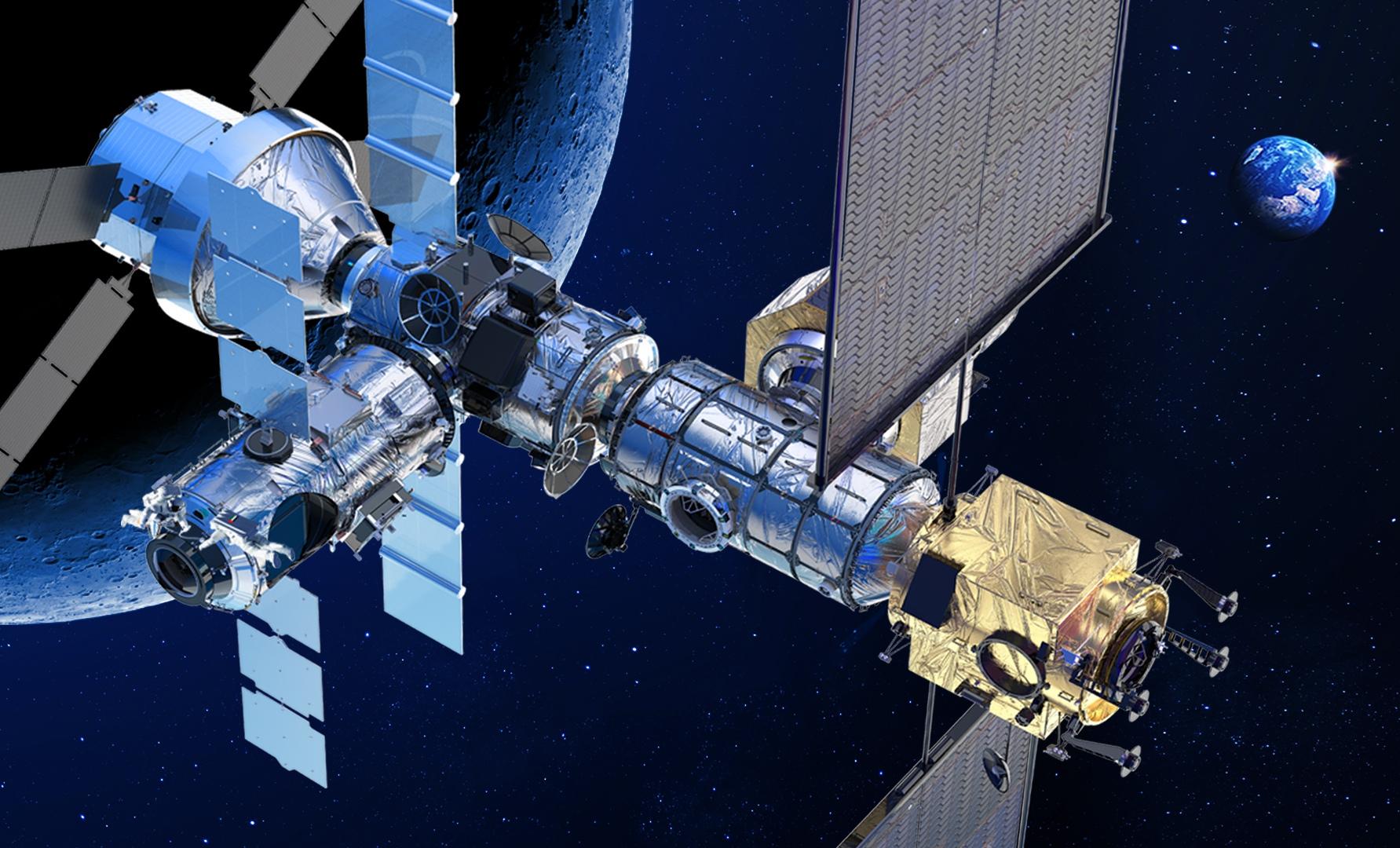
shifts for a year to get to a crucial launch date. Under such extreme conditions, Walter's role went beyond logistics; it entailed keeping team morale high, building resilience, and stayingfocusedunderextremepressure.


Again, a watershed moment came with Nodes 3 for the International Space Station (ISS). With skepticism and cancellationnegotiationsinAmerica,Walterchosetoproceed ontheirownterms.Agamblethatpaidoff-Nodes3provedan essential part of the ISS infrastructure, vindicating his visionaryleadershipandforesightinthetimeofuncertainty
Similarly,whentheExoMarsmissionwasinitsinitialphase, Walter led his team through the debacle of Schiaparelli lander'scrash.Heemphasizedthatmistakesarepartofbeinga pioneerandfortifiedtrustandcollectivedetermination. This quality of leading during crises by valuing credibility and



supportwhilecomprehensivelyknowingeverythinghasbeen characteristicofWalter'sleadership.
OneofWalter'scorevaluesisinspiringcuriosityinhisteams. Inthedemandingworldofspaceexploration,wheremissions consumelivestimeandagainbeyondthestandardworkweek, motivation and meaning are crucial Curiosity inspires engagement,whichleadstoinnovationandresilience.
Walter also realizes that risk-taking is part of extending the frontier Inprobingthelimitsofpotential,carefulhandlingof risk does not equate with risk aversion. On the contrary, it involves careful consideration of potential outcomes, especially where human lives or significant investments are involved.


His leadership fosters a culture where risk is calculated, failuresareexperienced,andfearisrecognizedasbeingasbig ofastumblingblockasmistakes.Thisfearlessapproachhelps to create bold action through responsibility and continuous growth.
Walteralsoemphasizesthestrengthofresilience—theability to bounce back and learn through adversity as a characteristic of effective teams Through encouraging openness and reflection, he turns adversity into steppingstonesratherthanobstacles,makingindividualsand thecompanystronger
Walter offers an advanced perspective on the European contributiontospaceexplorationglobally Europe
“Curiosity fuels motivation and keeps the sense of purpose alive in every challenge.”





financial, scientific, and technological historically,collaboratedwiththeUnited nations such as Russia, China, India, and


one real deficit: inadequate national missions and heavy-lift flights. These deep space and the establishment of This shortfall needs to be rectified if andextenditsglobalreputation.
stained investment in long-term — infrastructure building in low Moon, and subsequently on Mars — but cooperation on equal terms. He wants as an equal partner, not a follower leaders.
HealsoacknowledgesthatEurope'sstrengthliesnotonlyin technologybutalsoinacollaborativespiritandcapacityfor building international cooperation that advances common goalsinspaceexploration.WalterbelievesthatEuropeought to be employing such strength while increasing autonomous strategicdevelopment.
Walter's leadership extends beyond present missions to building future generations of visionaries and talent. He encourages students and young professionals to dream big coupled with active engagement. Walter believes aerospace needs individuals who don't merely react to commands but bring ideas, challenge assumptions, and take responsibility fordefiningstrategy.
He feels that businesses flourish when individuals are empowered to voice their opinions and have open communication.Hierarchiesmaybeneededforstructure,but inclusiveness and involvement add richness to decisionmakingandsharpencollectivevision.
Walter insists that teams and individuals within businesses canandmustmakeaninputonlargerstrategicdirectionsby sharedvisionandinitiative.
Hisadviceisstraightforward:bebold,beactive,andjoinyour voice in the common dream. The future of aerospace belongs tothosewithavisionofcuriosity,collaboration,andbelief.
Walter has an inspiring idea of humanity's venture off the planet Earth, one that is centered on the development of a sustainablehumanpresenceonMars.Itisnotonlylandingon the planet but adapting to Mars's harsh environment, developing life support systems, and building a selfsustainingcommunity.
Terraforming, being a long-term and hypothetical goal, is secondary to the immediate issue of making Mars habitable through innovation in infrastructure and life support Effective and safe transport between Mars and Earth is also stressedbyWalter
HeisconvincedthatmakinglifeoffEarthisnotonlypossible butviableandsecure.Itisimportantforhumanity'ssurvival and for opening the next great chapter of exploration. This visioncontinuestomotivatehisworkandleadership.
Walter would like to be remembered not just for tangible achievements, but for the vision and inspiration that he broughttohisteams.Hewantstoberememberedasaleader who shared meaning and pride in the common journey, one whohelpedothersdiscovermeaningintheirwork.
His career is marked by the rare combination of visionary perspective,realisticleadership,andanuntiringcommitment to pushing beyond the frontiers of human activities in exploringouterspace.Walter'staleisoneofpassiontoaction, areminderofthepotentialpowerofwhatcanbedonebyone individualtoshapetheaerospacefuture.
Walter is a living embodiment of the aerospace exploration spirit inquisitiveness, innovation, persistence, and purpose-driven leadership. His life journey from an openeyed youth watching the moon landing to a policymaker shaping missions to Mars is testament to his commitment to humanaspirationtolearnandexploretheuniverseallhislife.
Under his guidance, ThalesAlenia Space Italia continues to lead the way, combining bold innovation with realistic application, reconciling disparate stakeholders, and guiding thenextgenerationofspacetravelers.Walter'slegacyisnotin number of missions flown or technologies developed but in thevisionaryteamsandshareddreamsthatpropelhumankind tothestars.

Commercialflightinthefutureisbeing revolutionizedbytechnologicalprogress, environmentalnecessity,andchangingpassenger desires.Astheworldbecomesmoreglobalizedandair travelneedsincrease,manufacturersandairlinesenvision thefutureofflightascleaner,moreluxurious,andmore efficient.Autonomoustechnology,greenenergy,andmuch moreiscominginthecomingdecadesastheskyitselfis redesignedbychangingtransporttrends.Theynotonly addresstheshort-termissuesoftheindustrybutalsolaythe groundforasmarter,safer,andmoresustainableaviation world.
This article discusses some of the most significant drivers of the future of commercial aviation, from sustainability to innovation in technology to shifting market forces.
Itsmostdauntingchallengetodayistheissueofits environmentalfootprint.Theaviationsectorisresponsible foraround2-3%ofcarbonemissionsglobally,something thatissettoincreaseasairtraveldemandcontinuestorise. Thesectoristhereforepushinghardtocutemissionswitha viewtomeetingnet-zerocarbontargetsbytheyear2050. SustainableAviationFuel(SAF)producedfromrenewable inputslikealgae,wasteoils,andagriculturalwasteis increasinglybeingconsideredasanimminentsolution. Whiletoday'sSAFproductionislimitedandcostly, governmentandprivateinvestmentsmustinterveneto increaseitsavailabilityandaffordabilityoverthenext severalyears.
Electricandhydrogenaircraftarealsopromisingzeroemissionlong-termalternativesforflying.Whileelectric planesareidealforshorthopsduetothebatterylife, hydrogenpowermaybeusedtoflyfartheronacleanerburningfuelthanfossilfuels.Largeaircraftproducerslike BoeingandAirbusareinvestinghundredsofbillionsof dollarsintoresearchandprototyping,andtheircommercial planeswillbeavailableinthecomingtwodecades.The aforementionedinnovationssayalotabouttheindustry focusonsustainabilityduetoregulatorydriversaswellas customerdemandforcleanertravel.

Futurecommercialaircraftwillnotjustbecleanerbutalso intelligentandefficient,owingtothequickexpansionof digitaltechnologyinnovation.Artificialintelligence(AI), machinelearning,andanalyticsarerevolutionizingaircraft flightoperations,maintenance,andcustomerservice. Predictivemaintenance,forinstance,enablesairlinesto predictapart'sfailurepriortooccurrence,lowering downtimeandoperatingexpenseconsiderably.Real-time analysisofdataalsoassistswithflightandfuelrouting optimization,withgreateroverallefficiency.Inthecockpit, automationisbackedbynext-generationavionicsthat promoteincreasedsituationalawarenessandpilotdecisionmakingsupport.
Whileautonomouscommercialflightisalong-rangegoal, automatedfunctionswilldecreasepilotworkloadand increasesafetyinthenearfuture.Passengerexperienceis alsobeingupgradedthroughdigitalinterfaces,customized services,andbiometricidentitytechthatsimplifiescheck-in andboarding.5Gandsatellitenetworkingwillalso transformin-flightentertainmentandcommunicationsby mergingairandgroundinrealtime.
Withshiftingworlddemographicsandchangingpassenger patterns,airlinesneedtoadaptinresponsetonewmarket forcestoremaincompetitive.TheCOVID-19crisis exposedtheweaknessesoftraditionalairlinebusiness modelsandacceleratedtheirevolutiontowardsmore responsivecustomer-centricmodels.Duringthepostpandemicphase,thereisgreateremphasisonhealth,safety, touchlesstravel,andflexiblebookingprocesses.Airlines arealsoemployingdatainsightstooffercustomized pricing,location-basedmarketing,andrewardprograms thatresonatewithcurrenttravelers.
Low-costcarriersandregionalairmobilityare alsoreshapingaviationpatterns.Small,nimble planesareplacingnon-stopordersbetween secondarycities,breakingthegripoflarge hubsandenablingpoint-to-pointtravel. Urbanairmobility(UAM),basedon electricverticaltake-offandlanding (eVTOL)aircraft,isanotherareathat canreconfigureshort-distance mobilitywithinandbetweencities. Althoughstillinitsnascentstages
ofdevelopmentandregulatoryauthorization,UAMisa futuristicvisionfortheaviationindustrythatexpandsthe limitsofcurrentcommercialnetworksandencompassesthe growingnecessityforenhancedspeedandconveniencein travel.
Thebusinessaviationfutureisoneofpotentialand transformation.Withthesectorfacedwithpotentialfrom anythingtoclimaticturbulencethroughtechnology upheaval,thesector'sresilienceandadaptabilitykeepthe paceofimprovement.Throughthefocusonsustainability, expandingdigitalpossibilities,andreinventingmarket strategy,commercialaviationcanseeafutureofsmarter, safer,andmoresustainableairtransport.Theseinnovations willnotjustchangetheflightexperiencebutwillalso transformtheworld'stransportinfrastructure.Allthe stakeholdersintheaviationecosystem—regulators,airlines, manufacturers,andpassengers—needtocometogetherto achievethisandmakethefutureofaviationdesirableand possible.
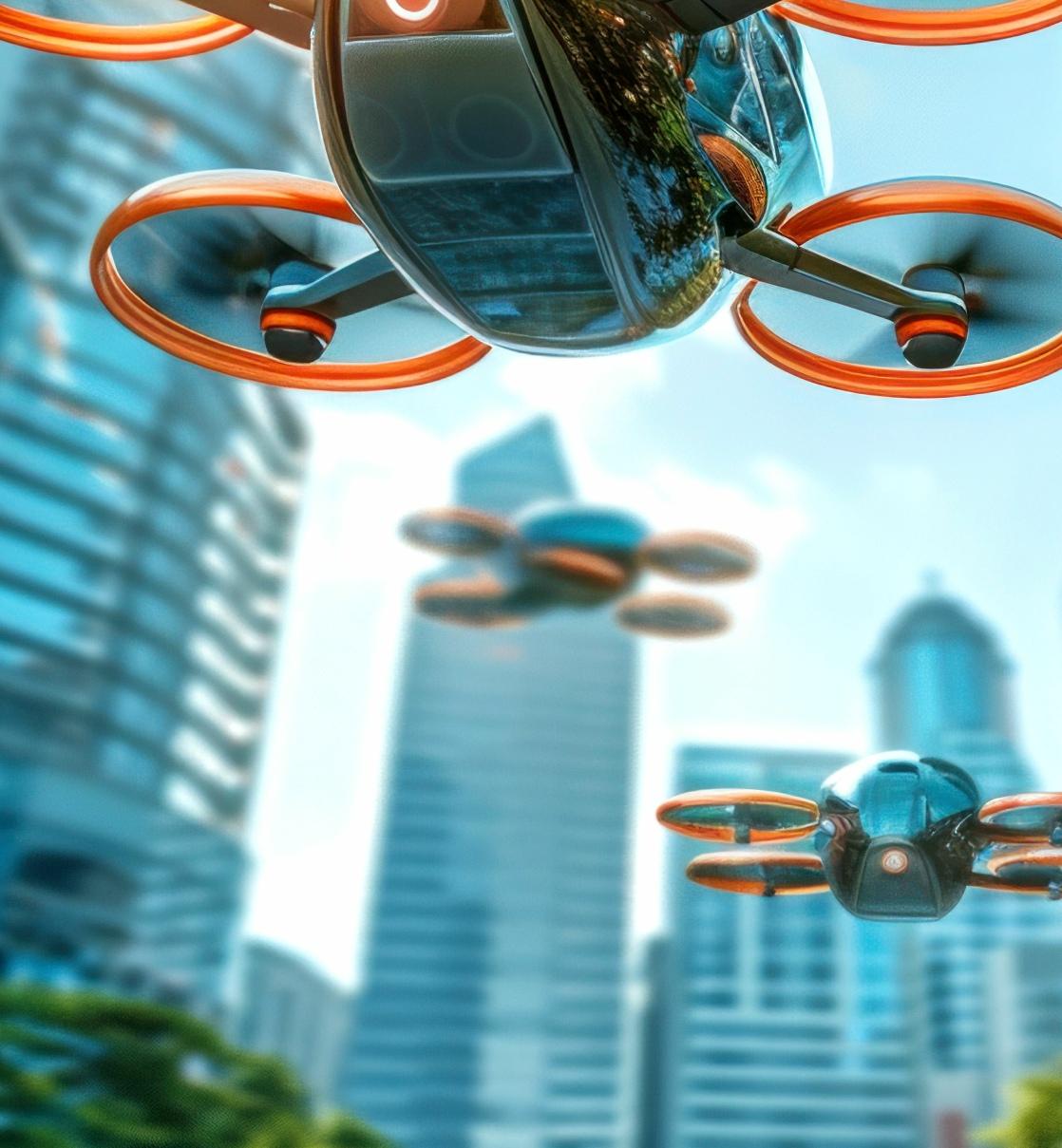








The aerospace industry has long been a symbol of human
ingenuity, ambition, and progress. From the first powered flight by theWright brothers to reusable rockets by SpaceX, aerospacedevelopmenthasevolvedtremendously.Yet,aswestandon thethresholdofanewera,thepaceofinnovationisonlyaccelerating.
The future of aerospace development is poised to transform not just howwetravel,buthowwelive,work,andexplorethecosmos.
Oneofthemostcriticalareasinaerospacedevelopmentissustainable aviation. Climate change and environmental concerns are prompting governments and corporations to rethink traditional aircraft propulsion systems. The industry is shifting toward hybrid-electric andfullyelectricaircraft,withcompanieslikeAirbusandRolls-Royce investingheavilyinzero-emissionflighttechnology
Hydrogen-powered aircraft are another promising innovation. With water vapor as the only byproduct, hydrogen fuel cells present a cleaneralternativetofossilfuels.Althoughinfrastructureandstorage challenges remain, the push toward green aerospace development is undeniable. By 2040, we may witness commercial flights powered entirelybysustainableenergysources,drasticallyreducingthecarbon footprintofglobalairtravel.
OncedominatedbygovernmentagencieslikeNASAandRoscosmos, spaceexplorationisnowaplaygroundforprivatecompanies.SpaceX, BlueOrigin,andotherprivateplayersarespearheadinganewwaveof aerospace development focused on deep space exploration, lunar colonization,andevenMarssettlement.
Reusablerockettechnologyhasalreadyslashedthecostoflaunching payloads into space, democratizing access and opening doors for commercialsatellites,spacetourism,andinterplanetarymissions.


TheArtemisprogram,incollaborationwithprivatepartners, aimstoreturnhumanstotheMoonandestablishasustainable presence. Such initiatives are setting the stage for long-term human presence beyond Earth, driven by rapid aerospace developmentandglobalcollaboration.
Imagine hailing an aerial taxi from a rooftop and bypassing city traffic altogether. This futuristic vision is becoming a realitythankstorapidadvancesinelectricVerticalTake-Off and Landing (eVTOL) technology Companies like Joby Aviation, Lilium, and Archer are working tirelessly on prototypesthataimtorevolutionizeurbantransport.
Aerospacedevelopmentintheurbanmobilitysectorisdriven by the need for efficient, eco-friendly solutions to traffic congestionandurbansprawl.Theseflyingvehicles,powered byelectricpropulsion,offerquiet,fast,andsustainabletransit options. With regulatory approvals and infrastructure still catchingup,theskiesaboveourcitiescouldsoonbebustling withcommuterdrones.
The integration of artificial intelligence and automation in aerospace systems is transforming design, manufacturing, and operations. Digital twins—virtual replicas of physical systems—arenowwidelyusedtosimulate,test,andoptimize aircraftperformancebeforetheyeventakeflight.
PredictivemaintenancepoweredbyAIreducesdowntimeand operational costs, enhancing aircraft reliability and safety. Additionally, autonomous navigation systems are being developed for drones and spacecraft, paving the way for unmannedmissionsandcargodeliveries.Thesedigitaltools arenotonlyenhancingefficiencybutarealsoshapingthevery futureofaerospacedevelopment.
Aerospace development is deeply intertwined with national defense strategies. Hypersonic weapons, advanced stealth technology, and space-based surveillance systems are becoming focal points for global superpowers. The race to dominatethehighfrontierhasaddedurgencytoinnovations in satellite constellations, anti-satellite systems, and cybersecureaerospacecommunicationnetworks.
The establishment of military-focused space agencies, like theU.S.SpaceForce,signalsastrategicshiftinhowcountries
perceive aerospace dominance. Future warfare and national defense will likely hinge on advancements in aerospace developmentthatgofarbeyondtraditionalairsuperiority
As aerospace development pushes the boundaries of what's possible, global collaboration becomes increasingly crucial. International partnerships in space exploration, climate monitoring,andaerospaceresearcharelayingthefoundation foramoreinterconnectedworld.
However, this growth also demands robust policy frameworks From airspace regulation to space debris management,internationallawmustevolvetokeeppacewith innovation. Organizations like the International Civil AviationOrganization(ICAO)andtheUnitedNationsOffice for Outer Space Affairs (UNOOSA) play critical roles in shapingthefutureofaerospacegovernance.
Despitethepromise,thepathforwardisnotwithouthurdles. Aerospace development requires massive investments, long lead times, and rigorous safety standards. Supply chain disruptions, workforce shortages, and geopolitical tensions can delay progress. Additionally, ethical concerns around privacy, security, and environmental impact will need to be addressedwithtransparencyandforesight.
Educationandworkforcedevelopmentareequallyimportant. As the industry becomes more technology-driven, the demand for highly skilled engineers, pilots, and technicians will soar. Investing in STEM education and cross-border talent exchange will be vital for sustaining long-term aerospacegrowth.
Aerospacedevelopmentisnolongerjustaboutflyinghigher or faster it’s about redefining what's possible. From sustainable aviation and urban air mobility to deep space missions and AI integration, the future holds boundless opportunities.
As we embrace this exciting trajectory, it’s essential to balance innovation with responsibility, and ambition with collaboration. The future of aerospace development lies not onlyintheskiesabovebutinthecollectivevisionofhumanity toreachforthestars—together
